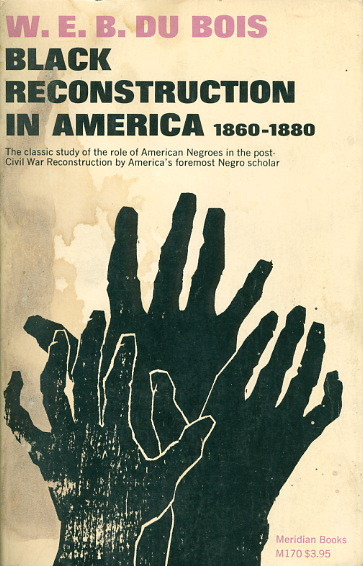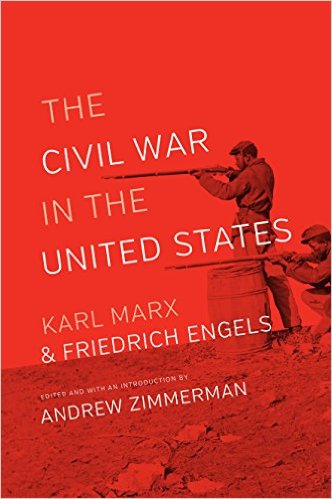 Timothy Messer-Kruse’s reply
Timothy Messer-Kruse’s reply
to my earlier post about his book The Yankee International confirmed two things for me. First, wading into unfamiliar historiographical debates is treacherous business. Second, Marx’s ideas still rile!
This twentieth-century historian has a great deal to learn about nineteenth century radicalism, so I am postponing a full response to Messer-Kruse until I am able to do more reading on the subject. For now, I will say that my reading of Marx and how his ideas played out in an American context is at odds with Messer-Kruse’s interpretation. Messer-Kruse portrays Marx and his followers as dogmatic on questions of race and slavery, among other issues. I think Marx’s thought on those issues and more was quite supple, and that such suppleness contributed to a full flowering of Marxist thought on American soil. But I have yet to prove this case, and I willingly admit that I may be wrong. In any case, I welcome the challenge, and for that I am glad Messer-Kruse responded as he did.
One thinker that Messer-Kruse failed to mention in his rebuttal is W.E.B. DuBois. I argued in my original post that Marx’s analysis of the Civil War exemplified his linking up race and class in ways similar to W.E.B. DuBois’s masterful Black Reconstruction in America (1935). After having recently re-read large chunks of Black Reconstruction, I can say with confidence that there is something to this connection. Also, I am not alone in thinking this.
 In his fantastic introduction to the new edition of The Civil War in the United States, a collection of essays and letters by Marx and Engels, Andrew Zimmerman argues that Marx and Engels laid the groundwork for DuBois’s Black Reconstruction, which Zimmerman calls “one of the most, if not the most, important interpretations of the Civil War today.” Marx and Engels believed that the Civil War was a revolutionary opening. DuBois built on this interpretation by arguing that the Civil War was a proletariat revolution within a bourgeois republic.
In his fantastic introduction to the new edition of The Civil War in the United States, a collection of essays and letters by Marx and Engels, Andrew Zimmerman argues that Marx and Engels laid the groundwork for DuBois’s Black Reconstruction, which Zimmerman calls “one of the most, if not the most, important interpretations of the Civil War today.” Marx and Engels believed that the Civil War was a revolutionary opening. DuBois built on this interpretation by arguing that the Civil War was a proletariat revolution within a bourgeois republic.
In short, Black Reconstruction was the work of a Marxist. An eclectic and original Marxist thinker, but a Marxist thinker no less. As his biographer Daniel Levering Lewis notes, DuBois was reading Capital with his Atlanta University graduate students while he was writing Black Reconstruction, and he used a chunk of the ample grant money he was awarded to hire the Trotskyist journalist Benjamin Stolberg for advice about Marxist theory.
Lewis offers perhaps the best general description of Black Reconstruction with the following sentence: “Analytical yet intuitive, densely researched but impressionistic, judicious and sweeping, Black Reconstruction pushed the figurative beyond the bounds of the historically permissible in its determination to integrate black labor into a Marxian schematic of proletarian overcoming.”
DuBois’s Marxism was unorthodox in a 1930s context because he did not consider slavery just another permutation of labor but a uniquely oppressive and dehumanizing institution. In other words, he put the lie to Thomas Carlyle’s quip that the Civil War was about people “cutting each other’s throats because one half of them prefer hiring their servants for life, and the other half by the hour.” Unlike some later Marxists, Marx and Engels did not think slavery and wage labor were remotely similar. But they did use slavery as an analogy for the capital-labor relationship because, as Zimmerman writes, “slavery reveals an economic fact that wages conceal”—that is, that the employer exploits the labor of the employed. DuBois drew a much sharper distinction between slavery and wage labor, but relied upon Marxist terminology and analytics to do so.
Another DuBois point of analysis that Marxists considered un-Marxist at the time, but that later became known to Marxists and non-Marxists alike as one of Black Reconstruction’s keenest insights, was his idea that southern working class whites preferred poverty to racial equality. DuBois called the basis of this “a sort of public and psychological wage.” Over half a century later David Roediger called this the “Wages of Whiteness.”
Sometimes the Marxist rhetoric in Black Reconstruction vexed readers, for example, DuBois’s insistence on labeling black resistance during the Civil War a “general strike.” He wrote: “As soon… as it became clear that the Union armies would not or could not return fugitive slaves, and that the masters with all their fume and fury were uncertain of victory, the slave entered upon a general strike against slavery…” DuBois was ahead of the scholarly curve for crediting blacks with winning the war and emancipating themselves. But calling it a general strike? Such terminology meant that DuBois was equating slave resistance to, say, the West Coast Waterfront Strike of 1934. He was putting slave resistance in a capital-labor framework.
DuBois was arguably the twentieth century’s best thinker on race. He wrote perhaps the best book on the Civil War and Reconstruction. And he did so through a Marxist lens. Is this fact incidental? Or is it formative?

11 Thoughts on this Post
S-USIH Comment Policy
We ask that those who participate in the discussions generated in the Comments section do so with the same decorum as they would in any other academic setting or context. Since the USIH bloggers write under our real names, we would prefer that our commenters also identify themselves by their real name. As our primary goal is to stimulate and engage in fruitful and productive discussion, ad hominem attacks (personal or professional), unnecessary insults, and/or mean-spiritedness have no place in the USIH Blog’s Comments section. Therefore, we reserve the right to remove any comments that contain any of the above and/or are not intended to further the discussion of the topic of the post. We welcome suggestions for corrections to any of our posts. As the official blog of the Society of US Intellectual History, we hope to foster a diverse community of scholars and readers who engage with one another in discussions of US intellectual history, broadly understood.
This is great.
I wonder about the “general strike” as a Marxist idea. I don’t know exactly where the CP (or the Trotskysts?) were on this at different moments in the 1930s–certainly there were plenty of examples of politically effective general strikes in Europe that Du Bois could have looked to. But earlier, the general strike is a syndicalist (and in the US, I guess, an IWW?) rather than a Marxist idea. The idea/tactic/dream was revived in France in the 1890s looking specifically to the US–but the Marxists didn’t like it at all. Maybe this wasn’t so in the US context?
No, I think you’re right, that it was largely a Wobbly inspired tactic. But in the Marxist milieu I suppose.
I believe that Christopher Phelps has done some deep dives into the history of the idea of the “strike” in and out of the Marxist tradition?
This is a fascinating post, and offers a great deal to consider. I think it’s no coincidence Du Bois uses a Marxist lens to examine Reconstruction in his work–not just because of his own turn to the Left in the 1930s, but because of the ways in which the Civil War and Reconstruction were being interpreted during the time period in which he wrote.
If you imbue the Civil War and Reconstruction eras with a greater meaning than merely “war between the states,” and recapture some of the class and race dynamics being formed during the 1860s and 1870s, a Marxist interpretation adds an urgency to the era that would have been important for Du Bois’ readers to understand in the 1930s. Yet, what I find most intriguing about this is how Marxists themselves responded to Du Bois’ book–some felt it was gross misinterpretation of Marxist theory, or at best a thin coat of Red paint onto a house Du Bois was struggling to build in his critique of Reconstruction historiography. This is something brought up in an article I emailed Dr. Hartman earlier today, “Rewriting History: The Publication of W.E.B. Du Bois’s Black Reconstruction in America,” published in Book History (Vol. 12, 2009, pp. 266-294).
Following up on a point in Robert’s comment, there’s some discussion of Ralph Bunche’s critical reaction to Black Reconstruction in R. Vitalis, White World Order, Black Power Politics, ch.5 (which is a book that’s been reviewed on this blog, if I recall correctly).
Vitalis’s cite is to Bunche’s short review of DuBois: “Reconstruction Reinterpreted,” Journal of Negro Education v.4 (1935).
Correction: It was not a review of Vitalis’s book but rather an interview with him, cross-posted from another site:
https://s-usih.org/2016/06/robert-vitalis-on-race-and-international-relations-guest-post.html
Thanks Louis.
Eric Foner sometimes borrows Charles and Mary Beard’s name for the Civil War: the Second American Revolution. The Beards did not recognize African-American military, intellectual, or other contributions to the Union cause (nor did they see it as a war caused by the slavery issue), but Foner, I think, sees something salvageable in that title nonetheless.
I’m wondering how much Du Bois was writing specifically against the Beards by insisting not just on the importance of African-American activity but also by shifting the focus of the War from the bourgeois revolution of Northern industrial vs. Southern agrarian capital to the struggle between capital and labor. We know well that he had the Dunning school in his sights; has anyone discussed his engagement (if it’s there) with the Beards’ histories?
Hmmm….I’ve never even thought about that. I’m going to do a little digging this weekend because that’s a fascinating question!
Good question, Andy. In fact DL Lewis answers this question in the affirmative in his DuBois biography. Lewis:
“…black people were either altogether excluded from the national narrative of the Progressive Historians or, when included, cursorily blamed for their own lowly and often desperate circumstances.”
Lewis goes on to cite specific egregious examples of the Beard analysis from “The Rise of American Civilization” in which they discounted blacks entirely in their analysis of the Civil War and then concludes: “In a real sense, the Progressives made common cause with the Dunningites.” So the implication is that DuBois saw himself challenging basically all of American historiography.
Although he doesn’t deal specifically with Beard’s “The Rise of American Civilization,” Staughton Lynd made a similar point in his essay entitled, “On Turner, Beard, and Slavery” contained in his classic Class Conflict, Slavery, and the United States Constitution.